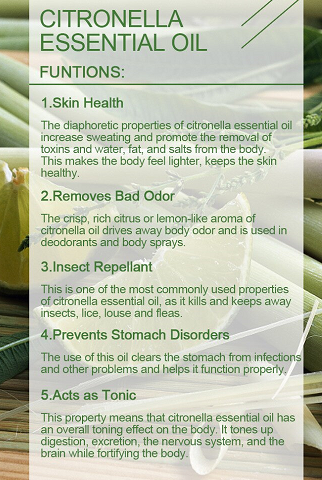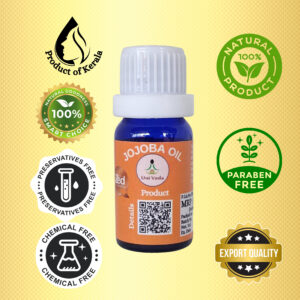OVERVIEW
Citronella oil is a natural essential oil derived from the leaves and stems of certain species of Cymbopogon grasses, particularly Cymbopogon nardus and Cymbopogon winterianus. It is widely known for its insect-repellent properties and is commonly used in various products such as candles, sprays, and lotions.
BENEFITS
Health and Wellness Benefits
Mosquito Repellent Properties
One of the most well-known benefits of citronella is its ability to repel mosquitoes. The aroma of citronella masks the human scents that attract mosquitoes, making it an effective natural alternative to chemical-based repellents.
Relaxation and Stress Relief
Citronella possesses calming and relaxing properties, making it an excellent choice for reducing stress and anxiety. Its soothing aroma can help create a peaceful ambiance, promoting relaxation and improved well-being.
Skin Care
Citronella is often used in skincare products due to its antibacterial and antifungal properties. It can help cleanse and purify the skin, making it a popular ingredient in soaps, lotions, and creams.
Aromatherapy and Citronella
Aromatherapy is a therapeutic practice that utilizes the scents of essential oils to enhance well-being. Citronella is commonly used in aromatherapy to uplift mood, relieve fatigue, and create an invigorating atmosphere.
Household Applications
Room Freshener
Citronella’s pleasant fragrance makes it an excellent choice for freshening up the air in your home. Whether through the use of essential oil diffusers or citronella-based sprays, it can help eliminate odors and create a welcoming environment.
Cleaning Agent
Citronella’s antibacterial properties make it a suitable ingredient for creating homemade cleaning solutions. By adding citronella essential oil to your cleaning routine, you can harness its natural cleansing abilities while enjoying its refreshing scent.
Safe Usage and Precautions
While citronella is generally considered safe, it is essential to use it responsibly and take necessary precautions to avoid adverse reactions.
Essential Oil Dilution
When using citronella essential oil topically, it is crucial to dilute it with a carrier oil to prevent skin irritation. Dilution ratios can vary depending on the intended use, so it’s advisable to follow recommended guidelines.
Patch Test
Before applying citronella oil to a larger area of your skin, perform a patch test by applying a small amount to a small section of skin and observing for any adverse reactions. This step helps determine if you have any sensitivities or allergies to citronella.
Avoiding Eye Contact
Citronella essential oil should never come into direct contact with the eyes.In the event of unintended contact, it is crucial to rinse the affected area thoroughly with water and, if irritation persists, promptly seek medical assistance.
GUIDE
How to Use Citronella
Citronella Essential Oil
Citronella essential oil can be used in various ways, such as:
Adding a few drops to an essential oil diffuser
Blending with carrier oils for massage or topical application
Creating homemade skincare products
Citronella Candles
Citronella candles are a popular choice for outdoor gatherings to keep mosquitoes at bay. The candles release the scent of citronella, creating a protective barrier against these pesky insects.
Citronella-based Products
Citronella is often incorporated into various products like lotions, sprays, and candles. These commercially available options offer convenience and can be easily incorporated into your daily routine.
Frequently Asked Questions (FAQs)
1. Can citronella be used on pets?
While citronella is generally safe for humans, it is not recommended for direct use on pets. Some animals may have sensitivities to citronella, so it’s best to consult with a veterinarian for appropriate pet-safe alternatives.
2. Is citronella safe for children?
Citronella can be used on children but in diluted forms and under adult supervision. It’s important to follow proper dilution guidelines and ensure it does not come into contact with their eyes or sensitive areas.
3. How often should I reapply citronella-based repellents?
The frequency of reapplication depends on various factors, including the product used, outdoor conditions, and personal activity level. It’s advisable to follow the instructions provided on the product label for optimal protection.
4. Can I use citronella indoors?
Citronella can be used indoors, primarily through the use of essential oil diffusers or citronella-based sprays. However, it’s important to ensure proper ventilation and avoid excessive exposure to the scent.
5. What are the alternatives to citronella?
If citronella is not suitable for you or if you prefer alternative options, there are other natural mosquito repellents available. Some alternatives include essential oils like lemongrass, lavender, and eucalyptus.
In conclusion, citronella offers a myriad of benefits and versatile uses, ranging from repelling mosquitoes to promoting relaxation and skin care. By incorporating citronella into your daily life, you can harness the power of nature and enjoy its many advantages.











Reviews
There are no reviews yet.